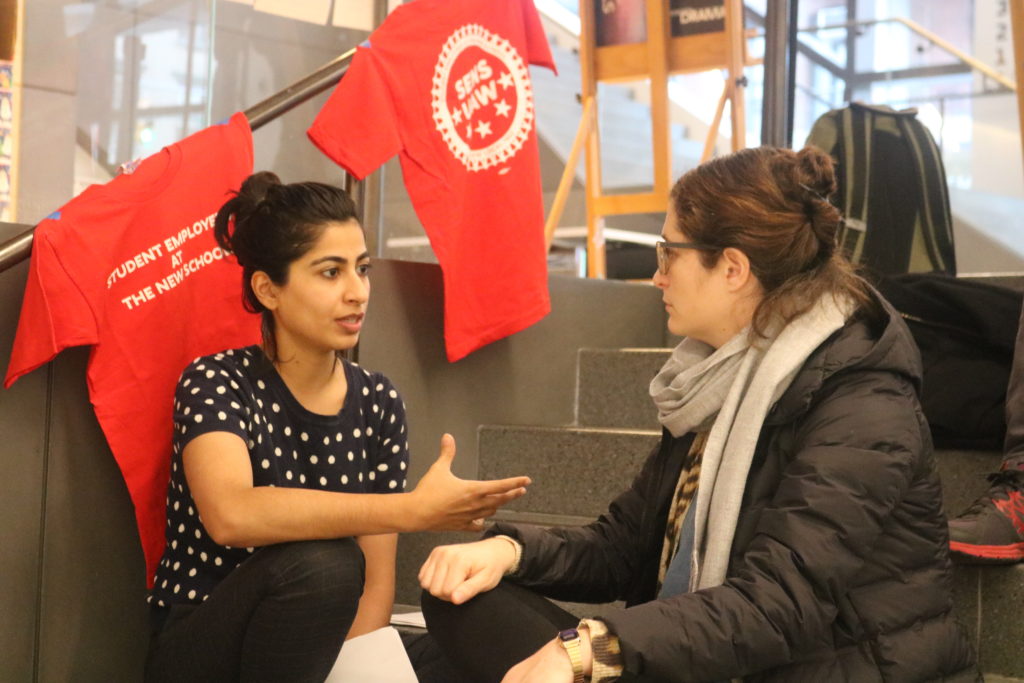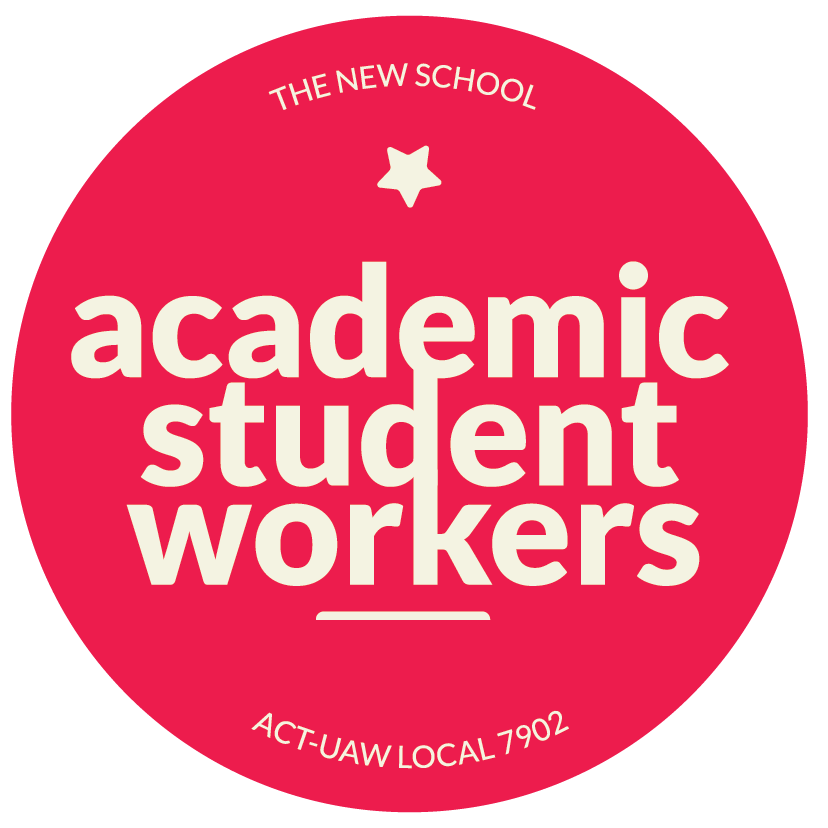
FAQ
Have questions about SENS? Answers below.
General Questions
We are SENS (Student Employees at The New School). We, as academic student workers at The New School, came together in 2015 and decided to form a union to collectively improve our working conditions. It was a difficult fight. In 2017, we voted overwhelmingly to form a union, 502 “yes” to “2” no. And in the spring of 2018, we went on strike. As a result of our organizing and the strike, we won a contract with The New School that provides us better benefits and greater protection from the administration.
Your SENS-UAW union representatives are:
- Interim Unit Chair*: Elijah Blanton (Economics, NSSR)
- Union Representative: Josephine D. Baker (Economics, NSSR)
- Union Representative: Juliana Serna Mes (Parsons School of Art and Design)
- Union Representative: TBD
*The Unit Chair is elected by the unit. The responsibilities include overall supervision of grievances, and interaction with stewards and union reps from the unit. The Unit Chair is a member at large on the Local’s Executive Board.
To see the rest of the 7902 Executive Board and Joint Council click here.
If you’re a teaching fellow, teaching assistant, research assistant, research associate, course assistant, or tutor, your job is covered by our union contract, and you’re entitled to union pay and benefits. You still need to sign up for the union (see “How do I sign up?”).
If you’re a student worker at TNS, but don’t have one of the job types listed above, your job is currently not covered by SENS, but is covered by NewSWU. NewSWU is not currently recognized by the university but is fighting for recognition.
We’re glad you asked! As a union member, you’re entitled to more benefits and rights than can be enumerated in the small space below. Here are a few:
1) Higher Pay. 2) A rebate on the university services fee and your health insurance premium if you work enough hours. 3) A neutral grievance procedure to protect against various types of harassment. 4) Protections against discrimination on the basis of citizenship, race, sexual orientation, gender, etc. 5) “Just Cause,” meaning you cannot be fired unless the university can prove you are not performing your job correctly. If interested in a full list of benefits and rights, see our Rights and Benefits page, read our contract, talk to your union rep., or email us.
We are always looking for ways to encourage the building of a strong union! We encourage you to attend our organizing committee meetings. Keep an eye out for email announcement for union events. Or, reach out to your union rep or email us at sensuaw@gmail.com.
Signing Up
At its most basic, a union is when workers come together to fight for better working conditions. This means that the more of us that sign up to become members, the more power we have to ensure TNS treats us fairly and to continue to build on the gains we’ve already made. Moreover, our union is democratic; signing up gives you the right to participate in union votes.
Yes. About half of our union is international student workers. Many of our OC members and union reps are also international student workers. You have the same legal right as a U.S. citizen to join a union.
Now we have a contract, all academic student workers are represented by the union. Per the bargaining agreement as stated in the contract, all workers are required to sign a union card to be a member in good standing. If you have not signed a card, please contact your union rep or email us at sensuaw@gmail.com.
We keep the union membership cards with your personal information private and secure! It’s important to have your contact information for us to reach you, if necessary.
Additionally, our union is democratic. Signing up gives you the right to vote in union elections.
Union Dues & Initiation Fee
Unions aren’t funded by wealthy donors or millionaires; they’re funded by the workers that form them, including you! Union dues are 1.44% of your total compensation. Additionally, you pay a one-time, $50 initiation fee. After you’ve signed up to become a member, dues and the fee are deducted automatically from your paycheck and sent to the union. It costs money to run a union. The dues money goes towards enforcing our contract with TNS, hiring organizers and lawyers when necessary, ensuring we get the benefits we negotiated for. Right now, the UAW staff who are working with us are doing so thanks to the dues we are paying.
PLEASE NOTE: The dues and initiation fee do not represent a decrease in your overall pay. Members ratified our union contract by a 90% ‘yes’ vote. No one would have voted to decrease their pay. Student workers voted to approve the contract, in part, because the pay raises we negotiated are far bigger than the dues and fee amount.
You only pay dues while working as a TF, TA, RA, CA, or Tutor and only after signing up for the union. You stop paying dues automatically when you stop working the aforementioned jobs. Remember, though you only begin to pay dues after signing up for the union, since you benefit from the union contract, it is a condition of your employment to pay dues. The easiest way to do so is to sign up.
Since every academic student worker benefits equally from the union, it’s only fair that every academic student worker contributes the same amount in dues. Say you start working on March 1st. Nearly all your peers sign up and start paying dues on March 1st, but you forget and don’t sign up until March 14th, two weeks later. You receive the same benefits as your peers, but didn’t pay dues for the two weeks between the 1st and the 14th, while they did. This wouldn’t be fair. Since you’re receiving the same benefits as your peers, you should pay the same amount in dues, regardless of when you sign up.
Back dues are meant to remedy this situation. Continuing with the example above, when you sign up on March 14th, you will pay the dues you would have paid had you signed up March 1st (the day you started working). The dues you pay are retroactive, meaning if you sign up late, you still pay the dues amount you would have paid had you signed up the day that you started your new job. So, if you sign up late, the dues deducted from the first paycheck you receive after signing up might be a bit higher than 1.44%, but that after that first check, will be just 1.44%.
Contacting Reps & Grievances
You do not need to confront a professor/boss/HR alone. We’re here to help! Now you can come directly to your union representative. A union representative will help you resolve the problem you’re having informally or formally. If necessary, your union rep will take you through the grievance procedure that allows you to voice your grievance about working conditions and make sure your boss is not violating the contract.
Remember: You are not alone – if you work extra unpaid hours, just think how many others do as well. Unions exist to change exactly these ‘norms.’ Proper working conditions are fair and just! For everyone!
Email us at: sensuaw@gmail.com.
You can also reach out to one of your unions reps:
- Interim Unit Chair*: Elijah Blanton (Economics, NSSR)
- Union Representative: Josephine D. Baker (Economics, NSSR)
- Union Representative: Juliana Serna Mesa (Parsons School of Art and Design)
- Union Representative: TBD
The UAW and Our Local
The UAW represents over 50,000 academic workers in the United States, more than any other labor union. Academic workers other schools in the region, such as NYU, Columbia, UConn, and UMass, are also a part of the UAW. Additionally, the the UAW represents part-time faculty at TNS. When academic student workers at TNS got together way back in 2015 to organize a union, they decided to partner with the UAW because of the union’s track record with student workers and the fact that the union already had a presence on campus, representing part-time faculty.
Our union’s full name is SENS-UAW Local 7902. Large national unions, such as the UAW, are composed of smaller sub-units, called “locals.” 7902 is the local of which we’re a part. Part-time faculty at TNS, Student Health employees at TNS, and adjunct faculty at NYU are also a part of Local 7902.
The New School
The administration claims to have budget constraints, but President David van Zandt was the 15th best-paid private college president in his first year on the job (at a middle sized institution). Furthermore, we have one of the highest paid provosts in the country and one of the highest paid housing directors in the country. These facts suggest that the budget constraints could be managed differently, that it is a matter of distribution, not a lack of resources. It’s not the size of the pie but how it’s cut that matters.
The stronger the union, the better we can fight any changes the university makes in regards to working conditions and numbers of jobs. The contract has instituted a grievance procedure by which we can formally fight the university on any changes we deem to violate the contract. From the experience of organizing unions at other universities (NYU, University of California, etc.), we know that the formation of unions has not reduced the numbers of jobs. Moreover, academic student workers at NYU have successfully challenged new fees the university imposed via their contract’s grievance procedure, forcing the school reverse the decision to charge new fees. We can do the same.
